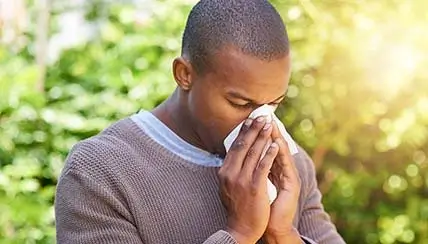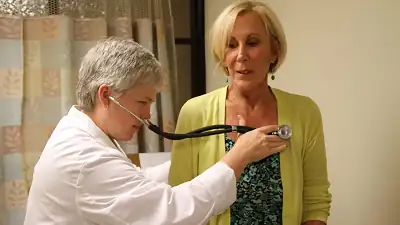Conditions We Treat
Adult Conditions
Search All Conditions
Results for A
- Acute Respiratory Distress Syndrome (ARDS)
- Allergic Bronchopulmonary Aspergillosis (ABPA)
- Allergic Rhinitis (Hay Fever)
- Allergic Rhinitis (Pediatric)
- Allergy
- Allergy (Pediatric)
- Alpha-1 Antitrypsin Deficiency
- Amyotrophic Lateral Sclerosis (ALS)
- Anaphylaxis
- Angioedema
- Anxiety
- Asbestosis
- Asthma
- Asthma (Pediatric)
- Atrial Fibrillation
Results for B
Results for C
- Cardiac Sarcoidosis
- Cardiomyopathy
- Cardiotoxicity
- Chronic Beryllium Disease
- Chronic Cough
- Chronic Obstructive Pulmonary Disease (COPD)
- Chronic Respiratory Infections
- Circadian Rhythm Sleep Disorders
- Clostridium Difficile (C. Diff)
- Coal Worker's Pneumoconiosis
- Colon Cancer
- Colon Polyps and Cancer
- Coping With Mycobacterial Disease
- Coronary Artery Disease (CAD)
- COVID-19
- Croup (Pediatric)
- Cystic Fibrosis (CF)
Results for D
Results for E
- Ear Infections
- Eczema (Atopic Dermatitis) (Pediatric)
- Eczema (Atopic Dermatitis) Overview
- Emotional Health (Pediatric)
- Emphysema
- Eosinophilic Esophagitis
- Eosinophilic Granulomatosis with Polyangiitis (EGPA)
- Eosinophilic Pneumonia?
- Esophageal Cancer
- Excessive Sleepiness
- Exercise Intolerance in Children
- Exercise-Induced Asthma (EIA)
- Exercise-Induced Laryngeal Obstruction (EILO)
- Exercise-Induced Shortness of Breath (Pediatric)
Results for F
Results for G
Results for H
Results for I
Results for L
Results for M
Results for N
Results for O
Results for P
- Parasomnias
- Periodic Limb Movement Disorder (PLMD)
- Peripheral Artery Disease
- Pleural Effusion
- Pneumoconiosis
- Pneumonia
- Polymyalgia Rheumatica (PMR)
- Primary Ciliary Dyskinesia
- Psychological & Social Issues
- Psychological Trauma
- Pulmonary Alveolar Proteinosis (PAP)
- Pulmonary Embolism
- Pulmonary Hypertension (PH)
Results for R
Results for S
Results for T
Pediatric Conditions
Results for A
- Advanced Heart Failure Program
- Allergy & Asthma Program (Pediatric)
- Allergy & Clinical Immunology (Adult)
- Allergy & Clinical Immunology (Pediatric)
- Allergy Treatment Programs (Adult)
- Allergy Treatment Programs (Pediatric)
- Alpha-1 Antitrypsin Deficiency Program
- ALS Clinic
- Ambulatory Pediatrics
- Anesthesiology & Perioperative Medicine
- Anticoagulation Clinic
- Assay Design, Development & Validation
- Asthma Toolkit Program
- Asthma Treatment Program (Adult)
- Asthma Treatment Programs (Pediatric)
- Asthma Tune Up Program (Pediatric)
- Atopic Dermatitis (Eczema) Program (Pediatric)
Results for B
Results for C
- Cancer Care
- Cancer Clinical Trials
- Cancer Registry
- Cancer Surgery (Off-Site Facilitation)
- Cancer Treatment
- Cardiac Rehabilitation Programs
- Cardiac Sarcoidosis Program
- Cardiology Program
- Cardio-Oncology Program
- Cell Biology
- Center for Deployment-Related Lung Disease
- Center for Genes, Environment and Health
- Center for Health Promotion
- Center for Post-COVID Care and Recovery
- Center of Excellence on Deployment-Related Lung Disease
- Chemotherapy
- Child Life Program
- Child Psychiatry Consultation
- Clinical Nutrition Services
- Clinical Pharmacology Consult Service (Pediatric)
- Clinical Research
- Clinical Translational Research Center
- Clinical Trials
- Cognitive Psychotherapy
- Colon Cancer Screening Program
- Colorado Acute Long Term Hospital
- Combined Aerodigestive Clinic
- Community Outreach
- Concierge Medicine
- Consultation with Medical Providers
- COPD Program
- Coping with Chronic Illness
- Coronary Artery Disease Program
- Coronavirus Treatment Programs
- COVID-19 Assessment Program (CAP)
- Critical Illness Recovery Center
- CT Scans and Radiation Dose Reduction
- Cystic Fibrosis Program (Adult)
Results for D
- Day Program (Pediatric) Overview
- Department of Immunology and Genomic Medicine
- Department of Medicine
- Department of Pediatrics
- Department of Radiology
- Deployment-Related Lung Disease Center
- Diabetes Self-Management Patient Education Program
- Diagnostic Laboratories
- Diagnostic Services
- Diagnostic Testing
- Division of Allergy and Clinical Immunology (Adult)
- Division of Cardiology (Adult)
- Division of Cell Biology
- Division of Environmental & Occupational Health Sciences
- Division of Gastroenterology
- Division of Hospitalist & Internal Medicine
- Division of Mycobacterial and Respiratory Infections
- Division of Neurology & Behavioral Health
- Division of Oncology
- Division of Pathology
- Division of Pediatric Allergy & Clinical Immunology
- Division of Pediatric Behavioral Health
- Division of Pediatric Clinical Pharmacology
- Division of Pediatric Pulmonary Medicine
- Division of Pulmonary, Critical Care and Sleep Medicine (Adult)
- Division of Rheumatology
- Division of Specialty Services
Results for E
Results for F
Results for G
- Gastroenterology Program
- Gastrointestinal Eosinophilic Diseases Program (Pediatric)
- Granulomatous Lung Disease Program
Results for H
Results for I
Results for L
Results for M
Results for N
Results for O
- Occupational Therapy
- Oncology
- Osteoporosis Treatment
- Otolaryngology (ENT)
- Outpatient Clinic (Pediatric)
Results for P
- Pediatric and Adult Immunodeficiency Diagnostic and Treatment Center
- Physical Therapy
- Pneumoconiosis
- Post-Deployment Lung Health
- Primary Ciliary Dyskinesia (PCD) Program
- Psychosocial & Behavioral Health Programs
- Pulmonary Alveolar Proteinosis (PAP) Program
- Pulmonary Diagnostic Center (Pediatric)
- Pulmonary Hypertension Program
- Pulmonary Medicine (Pediatric)
- Pulmonary Rehabilitation
Results for R
Results for S
Results for T
Results for U
Results for X
Condition Information
We integrate the latest scientific discoveries and coordinated care to treat a variety of conditions.
Health & Wellness Tips
More Health & Wellness
Results for A
- A Beginner’s Guide to a Plant-Based Diet
- A Better View of the Heart
- A Better View of the Heart
- A Tobacco Cessation Program that Works
- About National Jewish Health
- Advance Directive: Tools for Communicating Your Health Care Wishes
- Ah-Choo! What's Making You Sneeze?
- Air Pollution & Healthy Homes
- Alergias al Moho
- Alergias al Polen
- All You Need to Know About Allergies
- Allergies
- Allergies, Cold, Flu or COVID?
- Allergies, Cold, Flu or COVID?
- Allergy and Asthma Friendly Gift Ideas
- Allergy Infographics
- Altitude & the Heart
- Angina = Heart Attack
- Are Fruits and Vegetables Making Your Mouth Itchy? You May Have Oral Allergy Syndrome (OAS)
- Ask a National Jewish Health Cardiologist if You Should Exercise in Bad Weather
- Asma Provocada por el Ejercicio
- Assess Your Stress
- Asthma & Breathing
- Asthma & Pets
- Asthma and Air Pollution: What We Know
- Asthma Infographics
- Asthma Tips for Kids
- Asthma Tips for Summer
- Athletes & Asthma
- Avoiding Exercise
- Avoiding Infections at School
- Avoiding the "September Epidemic"
- Axial Extension
Results for B
- Back to School Checklist
- Back-to-School Sleep Schedules
- Best & Worst Cities for Asthma
- Best & Worst Cities for Ozone Pollution
- Better Health Starts After the Last Cigarette
- Bone Health
- Breaking New Ground
- Breath Test or Heart Rate?
- Breathing and Relaxation
- Breathing Science is Life
- Breathing Science is Life
- Busting Myths about Oxygen Therapy
Results for C
- Can Utensils Make You Sick
- Can’t Sleep? Try Alternatives to Counting Sheep
- Cancer & Tobacco
- Caring for a Nosebleed
- Caring for Someone with ILD
- Challenging Roadblocks
- Child Sleep Needs
- Childhood Obesity
- Cigarette Chemicals
- Cigars
- Cleaning Dirty Items
- Cleaning Supplies (Spanish Version)
- Clues Your Toddler May Have Asthma
- Cognitive Behavioral Therapy Helps Treat Insomnia
- Colonoscopia
- Common Treatments for Interstitial Lung Disease
- Como Identificar las Causas del Asma
- Como Reconocer las Senales De Asma
- Como Usar el Nebulizador
- Control de Flujo Máximo Para Adultos
- Control de Flujo Máximo Para Niños
- Control de los Medicamentos
- Coping Strategies
- COVID-19 When to Call the Doctor
- COVID-19 Who Should Get Tested?
- COVID-19: The Right Way to Put On and Take Off Cloth Masks
- COVID-19: What to Expect When You’re Recovering
- COVID-19: Who Are the Carriers?
- Creating Plant-Based Compounds to Prevent Infections
- Cutting Sodium
Results for D
- Daylight Saving Time & Sleep
- Delving Deep to Find Answers Annual Video 2018
- Depression Quiz
- Devices to Inhale Medication (Asthma Inhalers, COPD Inhalers)
- Diaphragmatic Breathing
- Diesel Exhaust Can Predispose Unborn Babies to Asthma
- Digestive Health
- Do Health Trackers Help You Lose Weight?
- Do I Have High Blood Pressure in My Lungs?
- Do You Know What an Asthma Attack Looks Like?
- Does Cold Weather Exercising Burn More Calories?
- Don’t Let Metal Allergy Ruin Your Hip or Knee Replacement
- Dowel Exercise
Results for E
- Eat to Heal During Cancer Treatment
- E-Cigarettes
- E-Cigarettes
- Eczema and Bathing
- Eczema Mistakes that Increase the Itch
- El Humo Secundario
- Emotional Management
- Energy Management
- Enfermedad de Reflujo Gastroesofagico
- Epinephrine Injection
- Esteroides Orales
- Evaluating a Home
- Exercise & Weight
- Exercise and Weight
- Exercise at Home
Results for F
- Facemasks Controversy: Who Really Needs Them?
- FAQ’s: Exercise & Heart Disease
- Fiebre del Heno
- Finding a Way to Prevent Chronic Infection in Cystic Fibrosis
- Finding Answers at National Jewish Health
- Finding Answers for Women Suffering with Dangerous and Elusive Lung Disease
- Fireworks
- Five Everyday Tips for Keeping Your Lungs Healthy Today
- Flu & Cold
- Flu Prevention Tips
- Flu Prevention Tips
- Food Allergies vs. Food Intolerance
- Food Allergy Infographics
- Fun & Healthy Ideas for the Lunchbox
Results for G
Results for H
- Have Asthma? You May also Have Reflux
- Health & Lifestyle Tips
- Health Effects of Breathing Wildfire Smoke
- Health Impacts of Noise Pollution
- Health Infographics
- Healthy Eating
- Healthy Homes: Eliminate Cockroaches
- Healthy Homes: Eliminate Mice and Rats
- Healthy Homes: Eliminate Tobacco Smoke
- Healthy Homes: Reduce Chemical Irritants
- Healthy Homes: Reduce Combustion
- Healthy Homes: Reduce Dust
- Healthy Homes: Reduce Dust Mites
- Healthy Homes: Reduce Mold
- Healthy Homes: Reduce Pet Allergens
- Healthy Snacking
- Heart / Lung Connection
- Heart Attack Symptoms in Women
- Heart Healthy Tips
- Help! How Can I Fall Asleep?
- Helping Chronically Ill Students Thrive at Morgridge Academy
- Helping Patients Improve After COVID-19
- Hidden Allergens at Home
- Hidden Holiday Food Allergens
- Hiking Season Health Guide
- Holiday Party Health Checklist
- Home Treatment for Insect Stings & Bites
- Hookah Smoking
- How Aging Affects Your Immune System
- How Aging Affects Your Lung Capacity and Ways to Protect Your Lungs
- How Are Right & Left Heart Diseases Different?
- How Bill Odom Got a New Lease on Life from National Jewish Health
- How Biologics Bring Us Closer to an Asthma Cure
- How Do Cardiologists Treat High Blood Pressure?
- How Does Predisposition of Asthma Transfer from Mother to Child?
- How Exercise Can Cause Asthma Symptoms
- How is Drug Allergy Different Than Drug Intolerance?
- How is Pulmonary Hypertension Diagnosed at National Jewish Health?
- How National Jewish Health Expanded Diagnostic Testing for COVID-19
- How Palliative Care Services Can Help Individuals with Chronic Conditions
- How Social Distancing Will Flatten the Curve
- How Summer Heat Affects Your Heart
- How The Lungs Protect From Flu
- How This Year's Hot Summer Air Can Affect Your Asthma and COPD
- How Thunderstorms Cause a Surge of Asthma Symptoms
- How to Avoid Food Allergy Surprises During the Holidays
- How To Avoid Nighttime Allergies and Sleep Better
- How to Avoid the Coronavirus
- How to Be Heart-Healthy All Day Long
- How to Choose the Right Type of Cardiologist
- How to Eat Healthy During the Holidays
- How to Get Started
- How to Lower Blood Pressure with Simple Changes
- How to Prevent a Heart Attack when Shoveling Snow
- How to Scale Down Your Portions
- How to Simplify Your Life & Improve Your Health
- How to Stay Ahead of Seasonal Allergies
- How to Use a Diskus®
- How to Use a Flexhaler®
- How to Use a HandiHaler®
- How to Use a Nebulizer
- How to Use a Neohaler®
- How to Use a Twisthaler®
- How to Use an Aerochamber® with Mask
- How to Use an Aerolizer®
- How to Use an Autohaler®
- How Winter’s Cold Air Can Affect Your Eczema
- How Your Health Improves After the Last Cigarette
Results for I
- Identifying Stressors
- Idiopathic Pulmonary Fibrosis (IPF) Management
- Idiopathic Pulmonary Fibrosis (IPF) Testing
- Impact on Adults
- Impact on Children
- Improve Your Heart Health
- Indoor Air Pollution
- Indoor Air Pollution: Cleaning Supplies
- Indoor Air Pollution: Decrease Exposure
- Indoor Air Pollution: Effects on Health
- Infant and Toddler Sleep
- Infographics
- Información de Español
- Insect Sting Allergies: What You Need to Know
- Insomnia? 5 Expert Tips to Help You Get Sleepy
- Instant Relaxation Drill
- Instrucciones de la Prueba de Espirometría
- Intensive Cardiac Rehab Has Amazing Outcomes
- Intimacy
- Is Cardiotoxicity Affecting Your Health?
- Is My Cough Pneumonia?
- Is My Snoring Dangerous or Just Annoying?
- Is My Snoring Dangerous?
- Is Your Child Getting Enough Sleep?
- Is Your Shower Head Making You Sick?
- Is Your Shower Head Making You Sick?
- Is Your Teen Getting Enough Sleep?
Results for K
Results for L
- Leading the Way
- Learn About COPD
- Learn How to Use an EpiPen -- It Could Save a Life
- Lifestyle Medicine: Improve Health, Food, Sleep, Exercise & Stress Management
- Live Better with COPD
- Living With a Sleep Disorder
- Living with a Work-Related Condition
- Living With Allergies
- Living with an Autoimmune Disease
- Living with an Immune Disorder
- Living with an Infectious Disease
- Living With Asthma
- Living with COPD
- Living with Eczema (Atopic Dermatitis)
- Living with Exercise Intolerance
- Living with Food Allergies
- Living With Food Allergies
- Living With Heart Disease
- Living with Heart Disease
- Living with Idiopathic Pulmonary Fibrosis (IPF)
- Living with Interstitial Lung Disease (ILD)
- Living with Lung Cancer
- Living with Lung Disease
- Living with Nontuberculous Mycobacteria (NTM)
- Living with Pediatric Vocal Cord Dysfunction (VCD)
- Living with Pulmonary Hypertension
- Living with Pulmonary Hypertension (PH)
- Living with Sarcoidosis
- Long and Short-Term Effects of Wildfire Smoke
- Long Term Effects of Insomnia on Health
- Love Your Numbers
- Lung Cancer at a Glance
- Lung Disease Can Affect Your Mood & Daily Living
- Lung Safety Tips for Campfires, Wildfires and Fire Pits
Results for M
- Maintaining a Healthy Weight
- Manage Asthma Year-Round
- Managing Rheumatologic Conditions
- Many Children With Asthma Use Their Inhalers Incorrectly, Leading To Serious Complications
- Masks Can Protect You from Allergies
- Medicamentos Inhalados con un Inhalador
- Meditation
- Men's Health Screenings
- Menthol Cigarettes
- Millions Diagnosed With Asthma May Not Have It
- Minimizing Shortness of Breath
- Modified Knee Bends
- Morgridge Academy
- Morgridge Academy | 2022 Video
- Morgridge Academy at National Jewish Health | One of a Kind
- Morgridge Academy Students Love the Renovation of Their School
- Morgridge Academy Students Visit the Colorado State Capitol
- Morgridge Academy’s Got Talent 2023
- Moving Forward with NTM
Results for N
Results for O
Results for P
- Parasomnias Make You Go Bump in the Night
- Past Quit Attempts
- Patient Stories
- Patient Stories
- Patients Found Better Lives with Answers from National Jewish Health
- Patients Share Stories of Fear, Hope and Finding Life at National Jewish Health
- Plan de Acción para Controlar el Asma
- Plant-Based Diets
- Pregnancy & Tobacco
- Preparing for Summer Camp with Allergies & Asthma
- Preparing to Quit
- Preventing Foodborne Illness
- Preventing Injury
- Progressive Muscle Relaxation
- Promising Treatment for People with Arthritis and Lung Disease
- Proper Hydration
- Protect Against Mosquito, Tick & Flea Bites
- Protect Your Child Against the September Epidemic
- Prueba de punción dérmica para las alergias
- Puntos Claves de Terapia para Pacientes Con Dermatitis Atópica
Results for Q
Results for R
- Reacciones Alérgicas a los Animales
- Reacciones Alérgicas de los Ácaros de Polvo
- Real Strategies from Ex-Smokers
- Reasons to Quit
- Reflux and Lung Disease
- Rehabilitación Pulmonar
- Research
- Returning to Care Safely
- Rewarding Yourself
- Rinitis Alérgica y No Alérgica
- Rising to the Challenge
- Rising to the Challenge
- Rockets and STEM Enthusiasm Soar at Morgridge Academy
Results for S
- Safe Exercise for Patients with Heart Disease
- Scare Away Allergy Fears on Halloween
- Secondhand Smoke
- Security Tips
- Seeing a Cardiologist for Cardiotoxicity
- Serving Size vs Portion Size
- Seven Things Everyone Should Know About Interstitial Lung Disease
- Severe Asthma
- Shaking the Sodium Out of Your BBQ
- Shortness of Breath and Eating
- Shoulder Blade Squeeze
- Shoulder Horizontal Abduction
- Signs of Irritable Bowel Syndrome
- Signs Your Heart Failure is Getting Worse
- Sinus Rinse
- Sinusitis
- Sleep & Sarcoidosis
- Sleep Health
- Sleep Hygiene Tips
- Sleep Infographics
- Slip Tracker
- Smokeless Tobacco
- Smoking & Physical Activity
- Smoking & Tobacco Use
- Smoking & Vaping
- Smoking Infographics
- Sodium Dangers
- Spring Allergies
- Stay Hydrated — Your Heart Depends On It
- Stay Out of Food Allergy Trouble this Holiday Season
- Staying Tobacco Free
- Step Ups
- Steps to Get Ahead of the Spring Allergy Season
- Steroids and Nutrition
- Stop Believing These Colonoscopy Myths Today
- Stop Those Germs
- Stress & Relaxation
- Stress Management
- Study: After Watching Disturbing Video, CPAP Usage Soars
- Summer Camp Rafting for Morgridge Academy Students
- Summer Ozone Dangers
- Survey: Common Asthma Warnings Overlooked
- Surviving Spring Allergies
- Surviving Spring Allergies
- Symptoms of a Weak Heart
Results for T
- Taking Multivitamins
- Talking to Your Doctor About Heart Failure
- Target Heart Rate
- Teaching and Caring for Ill Students Continues during COVID-19
- Teens & Smoking
- The 3 A's Strategy
- The Difference between Interstitial Lung Disease and Pulmonary Fibrosis
- The Future of Breathing
- The Hidden Ways Sugar Affects Your Heart
- The Interstitial Lung Disease (ILD) Program at National Jewish Health
- The Scary Truth About Teen Vaping
- The Symptoms of Idiopathic Pulmonary Fibrosis (IPF)
- Things to Know About Pneumonia
- Tips for Living Better with Pet Allergies
- Tips for Living Better with RA
- Tips for Parents Helping Their Child Cope with Chronic Illnesses
- Tips for Sleeping Better in the Heat
- Tips to Help Kids Cope with the Emotional Challenges of Eczema
- Tips to Help You Keep Movin'
- Tips to Protect Your Vocal Cords
- Tips to Quit Smoking
- Tips to Stop Insomnia and Get Back to Sleep
- Tobacco & Your Health
- Top 10 CPAP Life Hacks
- Top 10 Inhaler Mistakes Adults Make
- Top 10 Inhaler Mistakes Kids Make
- Top 9 Food Allergens and How to Avoid Them
- Top Reasons To Get Enough Sleep
- Top Tips for Better Sleep
- Top Tips to Help You Prepare for Flu Season
- Tratamiento de Lavados Nasales
- Travel Advice During Coronavirus
- Traveling with Oxygen
- Tricks for Beating Spring Allergies
- Truth: You Can Reverse Heart Disease, Derrick Did
- Types of Tobacco
Results for U
- Ultra-Processed Foods and Heart Disease
- Understanding Cardiotoxicity
- Understanding New EpiPen® Guidelines
- Understanding Oxygen Systems
- Understanding Pulmonary Hypertension
- Understanding Sarcoidosis
- Understanding the Long-Term Risks of Silent Heart Attacks
- Understanding the Pros and Cons of New Weight-Loss Drugs
- Understanding Vocal Cord Dysfunction
- Using A Respimat®
- Using a Spacer With an Inhaler
- Using an Aerochamber®
- Using the Ellipta Inhaler Device
- Uso del AeroChamber Ò con Mascarilla
- Uso Del AeroChamber®
- Uso del Nebulizador con Mascarilla
Results for V
Results for W
- Walk With a Doc
- Walk with a Doc Events
- Walk With A Doc Transforms Lives
- Walking Is Nature’s Best Medicine
- Warning Signs of Adult Onset Asthma
- We Breathe Excellence
- Wellness and Prevention
- Wet Wraps Cut Need For Drugs In Kids With Eczema
- What Are Food Allergies and How Are the Treated?
- What Are Hives and What Can You Do About Them?
- What Are Oxidants?
- What Are Pollen Allergies and How Can You Manage Them?
- What Causes a Heart Attack?
- What Causes Eczema?
- What Does Science Know About Vaping?
- What Has Love Got to Do with Your Health?
- What Is a Heart Murmur?
- What Is Allergic Asthma?
- What is Asthma and How Is it Diagnosed and Treated?
- What Is Atopic Dermatitis (Eczema)
- What is Chest Pain?
- What is Chronic Obstructive Pulmonary Disease or COPD?
- What is Clinical Research? FAQs Answered by National Jewish Health
- What is Deployment-Related Lung Disease?
- What is Eczema and How Is it Treated?
- What is Exercise-Induced Asthma?
- What Is Heart Failure, and What are the Four Stages of Heart Failure?
- What is Hepatitis?
- What is Idiopathic Pulmonary Fibrosis (IPF)?
- What Is Insomnia and How Does It Affect You?
- What is NTM & Are You at Risk?
- What is Oral Allergy Syndrome?
- What is Pediatric Behavioral Health Care at National Jewish Health?
- What is Pulmonary Hypertension?
- What Is Scleroderma?
- What Is the Allergic March?
- What Is Thunderstorm Asthma?
- What Makes Asthma Worse at Night?
- What Puts Men at Risk for Osteoporosis
- What Puts Pregnant Women at Risk for Heart Disease?
- What the Return of Measles Means
- What You Need to Know About Dust Mite Allergy
- What You Should Know About Kissing Bug Disease
- What’s Behind the Recent Rise in Tuberculosis Cases?
- What’s Buzzing? How to Identify Insect Sting Allergy
- What’s the Secret to Surviving Spring Allergies?
- What's the Connection? Your Heart Can Affect Your Breathing
- When Harmless Molds Cause Allergic Reactions
- When Is Asthma Peak Week?
- When Should You Be Worried About Heart Palpitations?
- When should you get a colonoscopy?
- When to See a Cardiologist
- When Your Heart Rhythm is Off
- Which Flu Vaccine Is Right for You?
- Why Do We Connect Love With The Heart?
- Why Flu Shots Are Important During COVID-19
- Why Lung Cancer Screening is so Important
- Why You Should Enroll Your Child with Asthma in Swimming Classes
- Wildfire Health Effects
- Withdrawal or Quit Symptoms
- Women & Smoking
- Women Are You Getting Enough Sleep?
- Words from a Frontline Physician in New York City





































